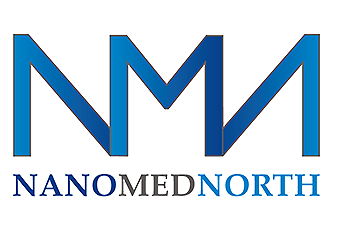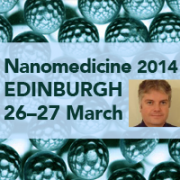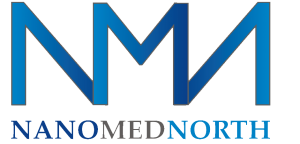Interview with the Conference Chair Dr. Andrew Owen. Nanomedicine 2014. March, Edinburgh, Scotland
If you haven’t yet read this interview, we would like to share it here!
Nanosuspensions and a Novel Synthesis of Solid Drug Nanoparticle Formulations
An interview with Dr. Andrew Owen
I’m delighted to announce that the British Society for Nanomedicine (BSNM) is collaborating with SELECTBIO to present Nanomedicine 2014 in Edinburgh, Scotland from 26-27 March.
Nanomedicine 2014’s diverse programme will provide insight across a number of emerging nanotechnologies that span from treatment to diagnosis. The programme includes the use of solid drug nanosuspensions for improving oral bioavailability and for sustained release formulations, recent developments in targeting nanoparticles through the use of aptamers conjugated to their surface and progress in siRNA delivery as well as cell and particle imaging.
The Conference Chair is Dr. Andrew Owen, Professor of Pharmacology for the University of Liverpool and Chair of the British Society for Nanomedicine. In today’s blog, Dr. Owen discusses the conference, the technology and his presentation.
SELECTBIO: Your presentation at Nanomedicine 2014 is titled “Improved Oral Delivery of Antiretroviral Drugs Via a Novel Synthesis of Solid Drug Nanoparticle Formulations”. Can you give us a prelude to what you’ll discuss?
OWEN: Solid drug nanoparticles have been produced commercially using technologies such as milling where large fragments of crystallised drug are ground into particles with diameters measurable in nanometers. This approach has been shown to overcome bioavailability issues for some poorly absorbed and insoluble drugs but does have some limitations because it is not compatible with drugs that have certain physiochemical properties. At Liverpool we have been working on a novel technology that produces solid drug nanoparticles through freeze drying or spray drying emulsions, which may be more broadly applicable across drugs. I will discuss the benefits of the approach with a specific emphasis on our antiretroviral programme.
SELECTBIO: As Chair of BSNM, what are the key goals the organisation has with regard to nanomedicine?
OWEN: The British Society for Nanomedicine is a registered charity (Charity number 1151497) and our mission includes the direct explanation of ongoing science and commercial developments to allow the public to understand and stay in touch with this exciting area as it impacts future global healthcare. We are also actively engaged in organising research-based meetings so that scientists can present their latest advances and highlight their work to industry, clinicians and other researchers. More details about the society can be found on our website at www.BritishSocietyNanomedicine.org
SELECTBIO: What do you feel are the current challenges in nanomedicine?
OWEN: The term nanomedicine refers to a spectrum of very different technologies that are deployed across diagnostics, therapy and regenerative medicine. While some of these technologies are in their infancy, others have already proved successful and have resulted in licensed therapies that are delivering patient benefits daily. Nanotechnology has received some bad publicity, not least through science fiction media, but it is important to emphasise the benefits it provides for the diagnosis, treatment and monitoring of disease.
SELECTBIO: What are some of the more interesting findings that have come about as a result of your investigations of solid drug nanoparticles (SDNs)?
OWEN: Our solid drug nanoparticle formulations have shown the potential for reduced doses and benefits for paediatric administration formats for antiretroviral drugs. These formulations have now undergone GMP manufacture and are in stability testing to support regulatory documentation for clinical evaluation. We are very excited by our pre-clinical data which has the potential to reduce the cost of therapy and expand the number of patients in resource-limited settings that can access therapy. Hopefully, these benefits will be confirmed in humans but we will rigorously assess this in the foreseeable future.
SELECTBIO: In your experience, how has nanomedicine research changed over the last 5-10 years and what impact has it had on research?
OWEN: Nanomedicine research continues to proliferate and this has resulted in new medicines and many therapeutic and diagnostic benefits are possible. Over the past 5-10 years there has been a large increase in the number of manuscripts describing the biological characterisation of nanomedicine candidates. There is still a strong emphasis on new material development but it is encouraging to see more pharmacologists and other life scientists engaging with the field.
SELECTBIO: What are some of the innovations you think will occur in the area of nanomedicine in the future?
OWEN: Two major global pharmaceutical companies have recently developed long-acting nanoformulations that can be administered once a month or even less frequently. In chronic diseases such as HIV this may represent a huge benefit to patients who currently need to take oral multi-drug regimens daily. Two such HIV drugs are now in later stages of development and it is important to consider development of other agents that are complimentary to these. There have also been recent developments in cancer with the first aptamer-targeted polymeric nanoparticle therapy entering phase II clinical evaluation. This is a really important area for future development since it allows specific-targeting of therapies to diseased cells or tissues within the body and has the potential to reduce off-target toxicities associated with many drugs and may therefore result in safer more tolerable medicines.
For more information about Dr Owen’s talk and to view the complete agenda, click here »
You can register to attend here »






Leave a Reply
Want to join the discussion?Feel free to contribute!